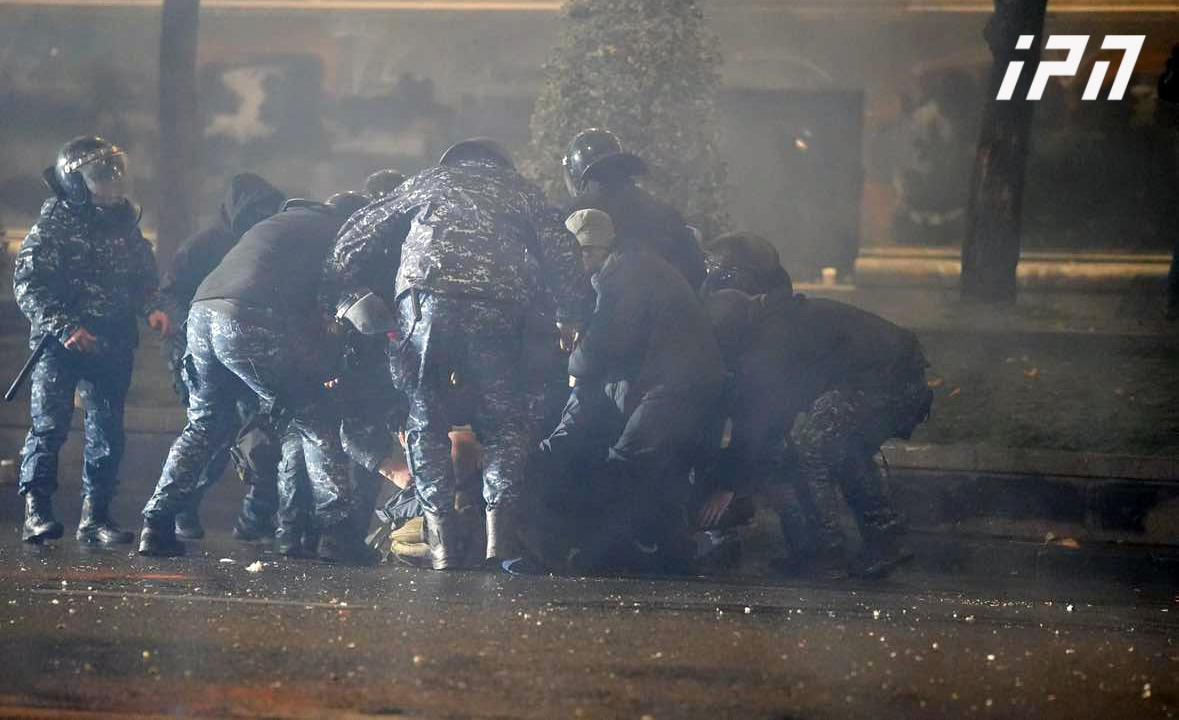
According to the 2024 report of the Public Defender, during the spring and winter of 2024, there were instances of alleged inhuman and degrading treatment by law enforcement against participants in peaceful assemblies, detainees, and journalists, and the degree of cruelty in the misconduct towards several individuals equates to alleged torture committed for the purpose of punishment.
In the annual report presented to Parliament by Levan Ioseliani, it is noted that last year was particularly severe and memorable in terms of rights violations during protests.
According to the Ombudsman, the number of individuals reporting misconduct during protests increased.
“In addition to beatings and violence by law enforcement officials, there were also incidents of harassment and violence against civil activists, journalists, and public figures by unknown persons, organized phone threats, and various forms of violent intolerance. Unfortunately, throughout the year, no criminal proceedings were initiated against law enforcement officers in connection with the protests, although in two instances of violence, recorded in different video footage, the perpetrators, law enforcement officers, were unmasked and could have been identified. In contrast, the number of individuals detained during protests reached several hundred. The detainees reported large-scale instances of illegal confiscation of phones and personal items,” the report states.
According to the Ombudsman’s report, the alleged misconduct, including torture and inhuman and degrading treatment, was systemic during both the spring and winter protests and, in some cases, widespread. Levan Ioseliani explained that several dozen victims indicated the use of similar tactics and methods of misconduct by the special forces.
“Employees of the Ministry of Internal Affairs' Special Tasks Department (STD) do not wear any identifying insignia, which significantly hinders the identification of responsible persons and seriously damages the investigative process. This, in turn, encourages impunity. In certain cases, the Ministry of Internal Affairs refuses to cooperate with the Special Investigative Service in identifying specific individuals. This hampers the investigation in identifying those responsible for human rights violations. There has been no attempt to hold police officers accountable for misconduct, even when identification was possible. The ongoing investigation in the Special Investigative Service is ineffective. The investigation is episodic and focuses only on potential accountability for individual officers without examining the events systematically, including possible orders or tacit consent from senior officials, and does not aim to provide a full picture. The investigation is not conducted under the articles of torture, threats of torture, or inhuman and degrading treatment. The investigation into the episodes of the spring and winter protests is being conducted under the article of exceeding official authority with violence, which does not adequately reflect the intensity and severity of the widespread misconduct. The investigation has almost failed to obtain relevant video footage from various state agencies or private entities, as well as footage from police body cameras and audio recordings of the so-called radio calls, with unsubstantiated or contradictory explanations. During the spring protests, almost no one from the different groups/individuals who physically assaulted activists and politicians has been held accountable. Similarly, those responsible for the violent actions of the so-called ‘black-masked’ groups during the winter protests, who brutally attacked, including journalists, remain unpunished,” the Ombudsman’s report says.
Levan Ioseliani also stated that many journalists became victims of misconduct during the protests, and they were obstructed in their professional activities.
“During the spring protests, only a few individuals reported the confiscation of phones and items, whereas during the winter protests, dozens of demonstrators reported the confiscation of mobile phones and personal items, as well as the checking of information on their phones. The number of women reporting physical violence and verbal abuse by law enforcement increased during the winter protests. Alleged misconduct towards minors and individuals with disabilities also emerged. The General Inspection of the Ministry of Internal Affairs has not yet initiated any disciplinary action against any police officers, despite several citizens and detainees pointing to different rights violations or verbal abuse. Administrative proceedings against protest participants are being conducted under the Administrative Offenses Code, which does not fully guarantee the right to a fair trial. Against the backdrop of the absence of legal guarantees, Parliament has significantly increased the relevant administrative penalties. In two cases, where defendants pointed to the illegal planting of narcotics and their unlawful detention, the police did not even attempt to obtain neutral evidence during the search and seizure process. The Public Defender’s office has found it difficult to locate detainees and determine their whereabouts prior to their placement in temporary detention facilities,” the Ombudsman’s report adds.
Levan Ioseliani explained that the criminal acts committed against the participants and detainees during the protests, in terms of their nature, severity, and intensity, are not simply an abuse of official authority and clearly indicate that the victims experienced acts of alleged torture, inhuman and degrading treatment.
v-if="article.gallery" v-html="article.gallery"
(adsbygoogle = window.adsbygoogle || []).push({});